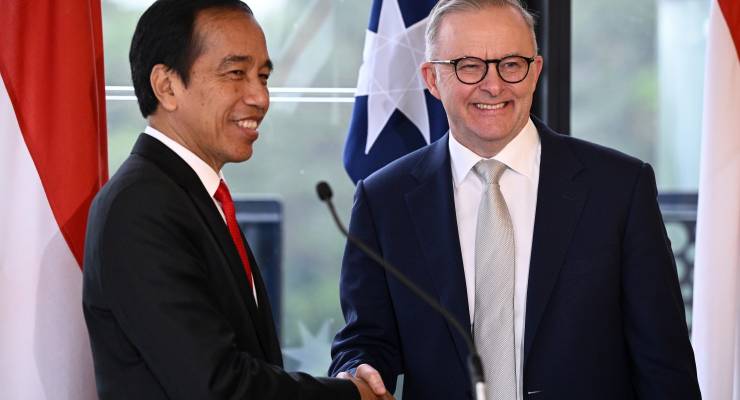
After a brief working visit to Australia, Indonesian President Joko Widodo returns to Jakarta with a substantial farewell gift: easier visa rules for Indonesian business travellers.
Indonesia has long chafed at visa inequality. Australians travelling to Indonesia enjoy $50 visas on arrival, but Indonesians coming to Australia usually have to fork out three to four times as much for a visa and may have to submit to a medical examination beforehand.
Dozens of other nations allow Indonesians to visit without visas, or offer them on arrival. Australia’s prickly requirements have been an irritant for our Pacific neighbour, sometimes seen by the Muslim-majority giant to the north as a signal of Australia’s suspicion and distrust.
Yesterday Prime Minister Anthony Albanese announced Australia’s stringent visa rules would be loosened, a sign of strengthening relations between the two nations. “Our countries continue to choose to draw closer together as economic partners, as security partners, and as partners in the global transition to net zero,” Albanese said after a leaders’ meeting at Sydney’s Taronga Zoo.
One concrete example of this “drawing together” is that Indonesians will soon be eligible for extended Australian business visas valid for three to five years and 10-year Australian frequent traveller visas.
Winding up a visit aimed at nourishing economic cooperation and trade ties, this partial visa win will burnish Widodo’s legacy in Indonesia. Nearing the constitutionally mandated end of his 10-year tenure, the president — widely known as Jokowi — remains hugely popular in Indonesia, and has repeatedly pushed for Australia to relax visa rules to boost cooperation and understanding.
In the interests of this increased understanding, it was announced during his visit that three Australian universities — Western Sydney University, Deakin University and Central Queensland University — will establish campuses in Indonesia, following in the footsteps of Monash University.
Widodo is also keen to jumpstart Indonesia into the fast-expanding world of green technology. In Sydney he met a range of Australian business leaders and called for cooperation in developing and manufacturing low-emissions technology.
Indonesia and Australia have substantial reserves of electric vehicle (EV) components, and Australia is the world’s largest supplier of lithium, an essential component of EV batteries. Yet both nations lag in the race to grab EV market share. Indonesia hopes to work with Australia to boost its EV production and carve a slice of the increasingly lucrative EV market.
“Indonesia and Australia must build a more substantive and strategic economic cooperation through the joint production of EV batteries,” Widodo said.
Work is also underway to strengthen cooperative defence ties, now overshadowed by AUKUS, the trilateral security pact between Australia, the UK and the US. Albanese said Australia understands that the security, stability and economic success of Indonesia is essential to keep the Indo-Pacific region on a trajectory of peaceful growth and increasing cooperation.
“As Australians feel the pressure from global economic challenges, it’s important that we’re investing in trading relationships to grow our economy, support good jobs and strengthen our supply chains,” Albanese said. “And of course there are few more important trading partners to us than Indonesia.”
In a joint communique, Albanese and Widodo “strongly deplored” Russia’s aggression against Ukraine and noted the “worsening crisis” in Myanmar, calling on the military junta to cease violence and allow unimpeded humanitarian assistance.
Indonesia will elect a new president early next year, and many hope Widodo’s successor will also look for peace and stability and not veer too far from the relations he has forged with Australia and in the region.








It will be interesting to see if there is a plan for Australia to make batteries ourselves or whether we stuck to the same neoliberal BS that previous governments have used to justify just exporting all our raw materials to other countries to get rich by value adding to our raw materials. Something that any self respecting country should expect as a given.
Im sick of this garbage. Lets make stuff ourselves.
we can’t have stuff manufactured here, particularly something as important as batteries! – it might lead to more people in unions
What on earth was the rationale for the extremely restricted visa conditions in the first place?
Indeed.
i’m guessing it was … racism ?
That’s always the go-to explanation, but it didn’t apply to other countries in the region did it?
Howard ramped up the conditions and costs to most of our neighbours. Morrison’s legacy was 1 million unprocessed visas. Student visas have just been increased to $710 with evidence of $A33000 by the student or a sponsor. Howard’s other legacy is to tax ALL non resident earnings at 31%. Of course they do not vote. Abbott doubled citizenship application elegibility to 4 years. Like Trump not a great welcome.
Jokowi has been a quiet, but great, achiever in leading his vast sprawling nation down a path of moderation and progress. That he “remains hugely popular in Indonesia” speaks volumes, not only for his own character and achievement, but for the spirit of the nation he has nurtured.
It’s good news and important especially as Australia spent much of the past generation, avoiding Asian neighbours i.e. disappeared from media unless incidents or disasters (ditto EU), while our skip media and (mostly LNP) politicians obsessed about rubbing shoulders with the ‘top people’ in London and Washington/NY.